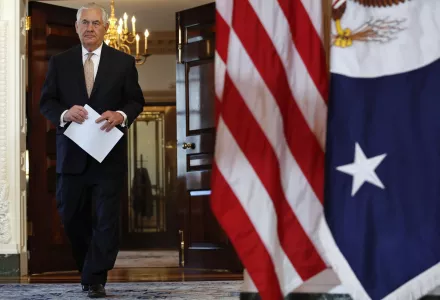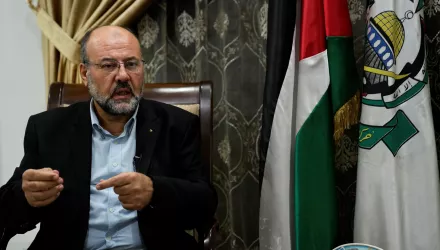
Note
Revisions were made on June 16, 2017 at the author's request.
What seemed to start with a report published on the Qatar News Agency (QNA) website describing claims by the country's emir, Tamim bin Hamad Al Thani, quickly escalated over the past week. Al Thani allegedly claimed that the relationship with the Trump administration was tense, described Hamas as the "legitimate representative of the Palestinian People," said Iran was "a big power in the stabilization of the region," and claimed that his country's relations with Israel "were good"—all statements that are relatively problematic for its neighbors. However, the Qatari Government Liaison Office issued a denial of the purported statements, said that the report was the result of hacking, and did not represent the genuine positions of the emir.
Yet, the statements contributed to increasing the tension surrounding Qatar. Relatively hostile articles about Qatari involvement in funding the Islamic State were circulated in the Gulf Arab press, with Emirati, Bahraini, and Saudi media publishing attacks on Qatar alleging that the latter had supported the Houthis in Yemen, al-Qaeda, Shia Riots in Saudi Arabia, the Islamic State, and the Muslim Brotherhood. These countries also blocked Qatari media including Al Jazeera. On Monday June 5, Saudi Arabia, the United Arab Emirates (UAE), and Bahrain in theory closed their airspace, sea, and land space to Qatar and expelled Qatari citizens and diplomats. The Saudi and Emirati–backed Yemeni government of Abdrabbuh Mansur Hadi, which holds part of southern Yemen, and the Maldives followed suit. In the United States, former U.S. defense secretary Robert Gates warned Qatar that they could lose the U.S. airbase, and Ed Royce, the Republican Chair of the House Foreign Affairs Committee, threatened Qatar with being labeled as a supporter of the Palestinian Islamist group Hamas, under an anti-Hamas bill he was introducing to curtail funding for that organization.
Qatar’s Role in the Middle East—A Rival to Saudi Arabia
The emergence of Qatar as an important regional foreign policy actor was actually thanks in large part to the United States. Qatar had, since gaining its independence in 1971, allowed Saudi Arabia to have a large influence on its foreign policy perhaps in order to ward off a Saudi invasion. However, on the eve of the Gulf War in 1991, in which Qatari forces fought as the allies of United States, the Americans established a deeper military cooperation with Qatar. The United States later also established prepositioned depots and the Al-Udeid Air Base. For Qatar, the base functioned as a deterrent, discouraging, for example, Saudi military actions against the country, as this could be seen as upsetting U.S. military interests, and this still holds true. As the result of growing U.S. ties, Qatar became bolder in pursuing an independent foreign policy after 1991, being less afraid of its neighbors. Clashes between Saudi Arabia and Qatar over Khofous, a small border hamlet claimed by both countries, took place in 1992. This resulted in unfriendly relations between the two countries throughout the early 1990s, including allegations against Saudi Arabia for staging a counter-coup attempt in February 1996 designed to reinstall the old emir, after his son had removed him from the throne, as well as Qatar and Saudi Arabia briefly being on different sides in the Yemeni civil war of 1994.
In the 2000s, the rivalry largely (with the exception of allegations from Qatar against Saudi Arabia for being involved in another counter-coup attempt in 2005) manifested itself in a less outwardly hostile fashion as both countries competed for influence over peace negotiations in Yemen, Lebanon, and between Israel and the Palestinians. Peace efforts became, in fact, a trademark of Qatari foreign policy, with its diplomatic mediation contributing to peace between Eritrea and Yemen in 1996, a short-lived reconciliation between Fatah and Hamas in 2006, Eritrea and Djibouti in 2008, Lebanon in 2008, Sudan in 2008, and Somalia in 2017.
Qatar also played the role of interlocutor between the United States and other factions to which it had few channels, bringing many to the negotiating table, including the Taliban in Afghanistan. However, Qatar's contacts with some of these organizations were also controversial. Its support for Hamas in the 2008 conflict between Israel and Hamas damaged relations with United States and Israel and led the U.S.-Qatari relationship to hit rock bottom, though it later improved again.
The Qatari relationship with Bahrain, Saudi Arabia, and the UAE was damaged by the special relationship between the Muslim Brotherhood and Qatar. Important Muslim Brotherhood scholar Yusuf Al-Qaradawi had actually been hosted in Qatar since 1961 and had been allowed to have his own show on Al Jazeera, the Qatari-based satellite TV station. During the Arab Spring, Qatar supported both the Syrian Muslim Brotherhood, Al-Islah in Yemen, the Egyptian Muslim Brotherhood, and Ennadha in Tunisia. This support was controversial because all of these organizations publicly endorsed democracy, while Qatar, and perhaps more importantly, its neighbors, where authoritarian monarchies. For the UAE and Saudi Arabia, the Muslim Brotherhood was seen as a threat. Yet, Qatar chose to stand by the Egyptian Muslim Brotherhood after it was ousted from power in 2013 as well as the Syrian Brotherhood after its failure to establish a strong foothold on the ground in Syria. More problematically for the relationship with the Emirates, Qatar chose to give political asylum to members of their Muslim Brotherhood in 2013, partly leading to another crisis between the Emiratis, Saudi Arabia, and Bahrain and Qatar in 2013–2014, where Qatar was seen as supporting the opposition in all of the three countries by hosting refugees and providing media coverage of incidents involving opposition activists.
Today's crisis has to be seen in the light of this history and in light of Qatar's past as a regional rival of Saudi Arabia, a continuing status guaranteed by the presence of a major U.S. military base in the country. The current rivalry and tension between Qatar and Saudi Arabia also needs to be seen in the light of a country, Qatar, that is attempting to thread a middle way, to befriend both Israel and Hamas and both the United States and Iran. Its peacemaking attempts have cost them at times, and it should be acknowledged that its support for the Muslim Brotherhood has made their path difficult, as have disagreements with Iran over Syria and Lebanon. Thirdly, it has to be seen in the light of Al Jazeera, a TV station more willing to cover the actions of Gulf monarchies states against their opposition than the rest of the government-controlled Gulf press. Perhaps this was why Qatar seemed to withdraw somewhat from its activist foreign policy after the new Emir Tamim bin Hamad Al Thani, took power in 2013 after his father's retirement. However, some of the resentment lived on, despite Qatar arresting Saudi dissidents and moderating its vocal support for the Muslim Brotherhood.
In the regional press, Qatar has been blamed for supporting al-Qaeda in the Arabian Peninsula and the Houthi rebels in Yemen simultaneously, which is an odd allegation since the two organizations are enemies. It was also blamed for supporting the Muslim Brotherhood, as well as for instigating the recent violence in the Saudi city of Qatif, and media incitement of "subversive elements." Ironically, these critiques highlight some of the advantages of having the Qatari voice on the international stage. Although being biased, Al Jazeera was actually willing to cover the conflicts in Qatif, where there has been a standoff for over a month due to the demolition of the old city, inhabited mostly by Shias. Al Jazeera was also covering the Bahraini police actions targeting Shia activists. In many ways, Al Jazeera is a corrective to a general Middle Eastern press that is controlled by the most dominant actors, which all are authoritarian. The support for the Muslim Brotherhood also is a support for an organization that generally supports more democratic structures than the Gulf monarchies.
Some of the critique against Qatar is serious; there have been elements within Qatar that has funded the Islamic State, al-Qaeda's central organization, and even Somalia's al-Shabaab. However, the United States should consider that the same could be said about Saudi Arabia; in fact, that country is the second largest source of foreign fighters for the Islamic State after Tunisia. In both countries, the authoritarian regimes have allowed members of the royal family or other prominent families, what are called "spacers" in a 2013 working paper—"Religion, prestige and windows of opportunity? Qatari peace making and foreign policy engagement"—namely individuals allowed considerable freedom in certain activities, to reign supreme in aid organizations, for example. However, in both countries, this is improving, and pressure should continue specifically on these activities and not on the role of the country as a whole.
The critique against Qatar for maintaining diplomatic contacts with Hamas (also for providing development aid to Gaza) and other organizations like the Afghan Taliban is also two-faced. Many U.S. allies, including Saudi Arabia, recognized Taliban in the 1990s. Others, like Norway, who have a tradition of keeping in contact with controversial actors for peacemaking purposes—have diplomatic contacts with controversial groups. In fact, such channels could be potentially useful for the United States in handling diplomatic crises, hostage situations, and natural disaster relief work, and this does not mean that the United States must go soft on either Hamas or the Taliban. Nor is Qatar an ally of Iran, as is demonstrated by their rivalry in Syria, though there is a possibility that Saudi and UAE diplomatic and military actions may now push Qatar closer to Iran.
The alliance against Qatar is not as solid as it seems. Other Gulf monarchies, such as Oman, also have a good relationship with both the United States and Iran. Kuwait, who has the Muslim Brotherhood seated in parliament, is watching. Somalia, a major aid recipient from Saudi Arabia, has also maintained its neutrality, encouraging the parties to reach a settlement through the Arab League. In the United States, the Pentagon maintains that its relations with Qatar are normal and stable. The Pentagon recently agreed to a $12 billion F-15 fighter jet deal with Qatar, showing that the United States still supports the Qatari armed forces. Egypt has not yet expelled any Qataris, perhaps out of fear of a Qatari counter move against the large number of Egyptians working in that country. Turkey, a major sponsor of the Muslim Brotherhood, has also quickly become a major ally of Qatar, even positioning its largest contingent of military forces outside Turkey and showing strong support. In many ways, Qatar made a major sacrifice in 2014 when they signed a pact of non-interference with their neighbors, and it would be reluctant to go further or to curtail its press. Hamas in turn, who moderated its charter and distanced itself from the Muslim Brotherhood, actually might become more radicalized when seemingly punished by Saudi Arabia.
The most important action for the United States to take in the current situation is to ease tensions between the two countries and continue to pressure both Qatar and Saudi Arabia to improve their investigation of individuals supporting al-Qaeda and the Islamic State. Qatar's unorthodox diplomacy, their provision of a stable, strategically situated basing area, and their record in bringing to light human rights issues in the Middle East could actually be useful for United States. A peaceful solution allowing Qatar to maintain these assets is in the U.S. national interest!
Statements and views expressed in this commentary are solely those of the author and do not imply endorsement by Harvard University, the Harvard Kennedy School, or the Belfer Center for Science and International Affairs.
Hansen, Stig Jarle. "Why the United States Needs Qatar, and Why the Current Conflict is Best Settled Peacefully." Belfer Center for Science and International Affairs, Harvard Kennedy School, June 15, 2017.



